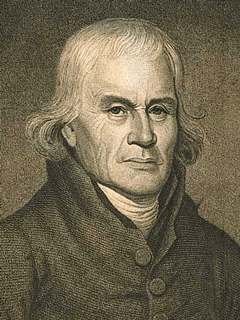John Wesley - 18th Century Circuit Rider
John Wesley is controversial for his split with the Anglican Church, and a tendency to lean toward Arminianism[1] during a time when Calvinism[2] was very much in vogue. During his lifetime, he literally covered the length and breadth of England on horseback, preaching an estimated 40,000 sermons, and covering and estimated 250,000 miles[3]. He also published or edited some 200 literary works, including a Christian library of fifty volumes. His life ministry resulted in a church of 135,000 members, with 541 itinerant preachers, and the foundation of the Methodist and Wesleyan denominations, worldwide now numbering about 12 million[4] and 411,000[5] respectively. He was born in 1703 in the small village of Epworth, in what is now known as Doncaster, in northeast England. His father was a Church of England minister, and his mother, Susannah, is said to have been an intelligent, pious mother of nineteen, who was a good teacher and firm with her children. Famously, Wesley was saved from a house fire at the age of six, an event that made a deep impression on him, and later caused him to consider this as God’s divine providence in his life [CALL].
At 17, Wesley entered Christ Church in Oxford, and later returned as a fellow in 1729. However, this experience left John dry and empty, as he tried to pursue his faith through good works, hoping that he would obtain salvation through obedience. His “methodical” approach to his faith lead him in 1735 to the colony of Georgia, in the New World, where he spent three years in ministry to the Indians, but considered his ministry there a failure. He returned to England in 1738 deeply aware of his own sinfulness [SIN], yet not having been freed from it, because, he later wrote, “he sought it, not by faith, but ‘by the works of the law.’” Perhaps because of his perceived failure, Wesley was open to other perspectives on faith, and was eventually converted that same year while listening to the reading of Luther’s preface to the Epistle to the Romans at a Moravian[6] meeting in Aldersgate, London. Wesley recounted, “I felt my heart strangely warmed. I felt I did trust in Christ, Christ alone, for salvation; and an assurance was given me that He had taken away my sins.”3 [FAITH]. Later that year, he even travelled to the Moravian headquarters in Germany to learn more from the people he considered influential in his own salvation [OPEN].
Wesley’s primary doctrines were (1) Personal salvation by faith [FAITH], (2) the witness of the Spirit, which he defined as, “the testimony of the Spirit is an inward impression on the soul of believers, whereby the spirit of God directly testifies to their spirit that they are the children of God” [SPIRIT], and (3) sanctification.
In his biography of John Wesley, H. K. Carroll writes that, “Wesley was the busiest man in England.”3 He rose at four in the morning, and daily went about preaching, teaching, fund-raising for schools, churches, and charities, worked with orphanages, cared for the sick, wrote books and carried on correspondence. [SINGLE]. Yet, for all his busyness, he still made time for prayer. Wesley’s prayer closet is one of the most famous aspects of this man’s life, who is quoted as saying, “God does nothing except in answer to prayer.”[7] [PRAY] Wesley’s love for the Word of God is obvious in his many writings. According to Carroll, “His written sermons are characterized by spiritual earnestness and by simplicity. They are doctrinal, but not dogmatic; expository, argumentative, practical”, and, “His mission was to spread ‘Scriptural holiness’ [WORD]."3
With all Wesley accomplished in his life, it is hard to imagine he also did this in the face of severe persecution. After all, Methodism was considered a splinter group from the Anglican Church, and the more Methodism grew, the greater the animosity toward Wesley and the Methodists. This weighed heavily on Wesley, but he pressed forward anyway. The following quote from the New Schaff-Herzog Encyclopedia of Religious Knowledge says it all,
“From 1739 onward Wesley and the Methodists were persecuted by clergymen and magistrates, attacked in sermon, tract, and book, mobbed by the populace, often in controversy, always at work among the neglected and needy, and ever increasing. They were denounced as promulgators of strange doctrines, fomenters of religious disturbances; as blind fanatics, leading the people astray, claiming miraculous gifts, inveighing against the clergy of the Church of England, and endeavoring to reestablish popery. Wesley was frequently mobbed, and great violence was done both to the persons and property of Methodists. Seeing, however, that the church failed in its duty to call sinners to repentance, that its clergymen were worldly minded, and that souls were perishing in their sins, he regarded himself as commissioned of God [CALL] to warn men to flee from the wrath to come; and no opposition, or persecution, or obstacles were permitted by him to prevail against the divine urgency and authority of his commission. [STAND].”3
John Wesley died in London, in 1791, after a short illness, and a long, fulfilling ministry to many.
[1] Denoting, relating to, or believing in the Christian Protestant doctrines of Jacobus Arminius, published in 1610, which rejected absolute predestination and insisted that the sovereignty of God is compatible with free will in man. These doctrines deeply influenced Wesleyan and Methodist theology. From the World English Dictionary, http://dictionary.reference.com/browse/arminianism
[2] The theological system of John Calvin and his followers, characterized by emphasis on the doctrines of predestination, the irresistibility of grace, and justification by faith. From the World English Dictionary, http://dictionary.reference.com/browse/Calvinism
[3] The New Schaff-Herzog Encyclopedia of Religious Knowledge, Philip Schaff Vol. XII, JOHN WESLEY (1703–1791), English evangelist; theologian; cofounder of Methodism, by H.K. Carroll, http://www.tlogical.net/biojwesley.htm
[6] Moravian- an Evangelical Protestant church movement started in Bohemia by John Huss that believes that saving faith is given in a moment, and offers dominion over sin coming from a sense of forgiveness.
[7] Catalyst Online, http://www.catalystresources.org/issues/272walt.html

